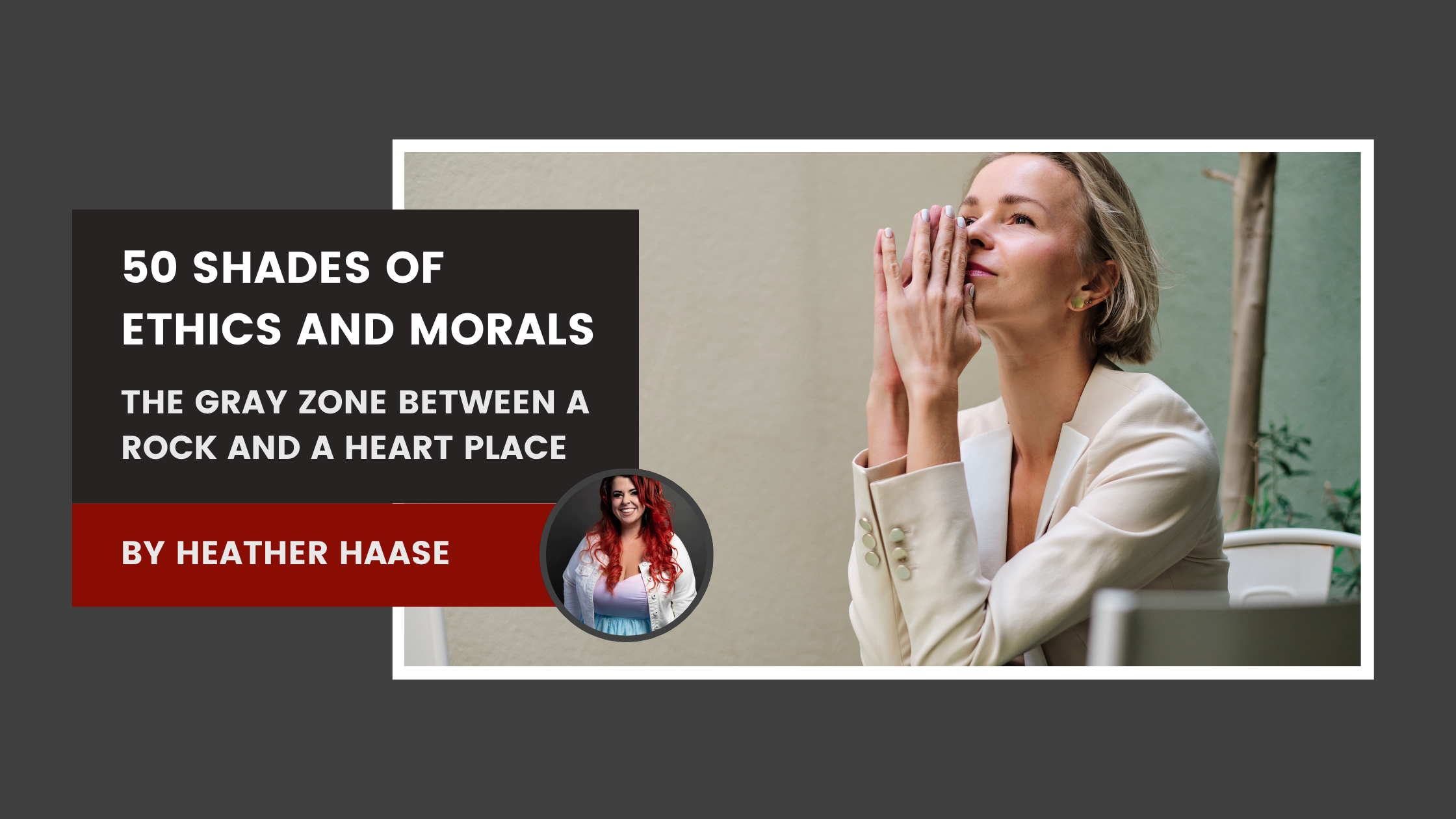Ethics vs. Morals in Real Estate: Navigating the Gray Zone with Integrity
Real estate is more than just transactions, contracts, and property listings. It’s a people-driven industry built on trust, relationships, and personal connections. At the heart of every decision a real estate professional makes, there’s an underlying question: “Am I doing the right thing?” But what defines “right” can often be a delicate balance between professional ethics and personal morals.
Though ethics and morals are sometimes seen as interchangeable, they are distinct forces that guide our actions. Understanding how they overlap—and where they differ—can help us navigate the gray areas of our profession with integrity, kindness, and clarity.
Ethics: The Standards We Follow
Ethics, especially in real estate, are the professional guidelines we agree to uphold as REALTORS. The National Association of Realtors (NAR) Code of Ethics serves as our North Star, setting standards for how we interact with clients, manage transactions, and conduct business. These ethical standards are non-negotiable; they ensure fairness, honesty, and transparency in our work. They are in place to protect not only our clients but also the integrity of our profession.
For example, as Realtors, we are ethically bound to be honest with all parties involved in a transaction. We must disclose material facts, manage funds with care, and put our clients’ interests above our own. These are not just suggestions; they are rules we commit to when we step into this profession.
Yet, while ethics define the baseline of our professional responsibility, they don’t always address the deeper, more personal dilemmas we face.
Morals: The Compass Inside Us
Morals, on the other hand, are personal. They come from within—shaped by our values, experiences, and sense of what’s right and wrong. While ethics provide a clear framework, morals are often more fluid, leaving room for personal interpretation.
During a summer course I took for an Accredited Buyer Representative (ABR) certification, the instructor discussed winning negotiations by leveraging the code of ethics. On the surface, this sounds like a great idea, right? However, some of the “ethical” strategies presented felt off, triggering what I like to call our Midwestern niceness. One example involved sign crossing a listing—where an agent would approach a seller already working with another Realtor. While it might be technically ethical, everyone in the class collectively said, “We would never do that. That is NOT ethical.” But what we really meant was that it conflicted with our personal morals and sense of fair play. “I would never do that to someone,” or “That’s not how we play in our area” is a common sentiment, reflecting that the gray zone between ethics and morals is real—and sometimes, what’s ethical doesn’t feel right to our hearts.
The Gray Zone: Walking the Line Between Right and Right
In real estate, the gray zone is inevitable. There are situations where what is ethically acceptable might not align with what feels morally right, and vice versa. Consider dual agency—where you represent both buyer and seller. Ethically, you are expected to remain neutral and ensure fairness to both parties. But morally, the challenge lies in truly being fair to both sides when subconscious loyalty naturally tends to favor one.
Another gray area I ponder involves working with clients who don’t speak English. Fair housing laws are crystal clear: discrimination is not allowed. And I would never intentionally discriminate against anyone. But on a moral level, I have to ask myself: Is it right to represent someone when I can’t explain the contract to them in their native language? Even if I hire a translator, how can I be sure that the translation is accurate, legal, or even fully conveys the meaning in a way that makes sense to my client? And what about confidentiality? These are questions for my lawyers and brokers, but they’re also moral dilemmas I wrestle with—questions that can’t always be answered by the NAR Code of Ethics alone.
This gray zone is also evident in how different regions interpret ethics. For those of us raised in environments where kindness and a sense of duty to others are ingrained, like the Midwest, we sometimes feel an ethical action goes against our personal code. While a specific tactic might be legal and ethical, it can clash with the deep-seated moral belief of treating others with fairness and respect.
Navigating the Gray Zone with Heart
When we face the gray zone, the answer isn’t always clear. But as professionals, we can lean on a few guiding principles to help us navigate these challenging moments:
- Start with Ethics, But Don’t Stop There: Our ethical obligations provide a strong foundation, but sometimes, doing the bare minimum isn’t enough. Lean into your personal morals to see where you can go above and beyond for your clients and community.
- Lead with Transparency: One of the most powerful tools we have is communication. When in doubt, be honest with your clients. Explain both the ethical guidelines you’re bound by and your personal perspective. Transparency builds trust—and trust builds lasting relationships.
- Trust Your Gut: There will be times when something just doesn’t feel right, even if it’s ethically sound. Trust your instincts. Our inner voice often speaks to what aligns most with our values, and listening to it can make all the difference.
- Seek Support When You Need It: None of us should have to navigate the gray zone alone. Whether it’s a mentor, colleague, or legal professional, don’t hesitate to seek guidance. Often, the perspective of someone outside the situation can bring clarity to a difficult decision.
- Prioritize Long-Term Relationships Over Short-Term Wins: Real estate is a long game, and your reputation is everything. Making decisions based on both ethics and morals helps ensure that the relationships you build are rooted in trust, integrity, and genuine care.
Conclusion: Defining Your Path Forward
As Realtors, we are in the unique position of being both ethical professionals and compassionate human beings. We are entrusted with helping people make some of the most significant decisions of their lives. Balancing our professional ethics with our personal morals allows us to do this work in a way that is not only legally sound but also deeply human.
In the end, our legacy in this profession will be defined not just by the deals we close but by the lives we impact. By navigating the gray zone with heart, empathy, and integrity, we can create lasting change in the communities we serve—and in the lives of those we touch.








Leave a Reply